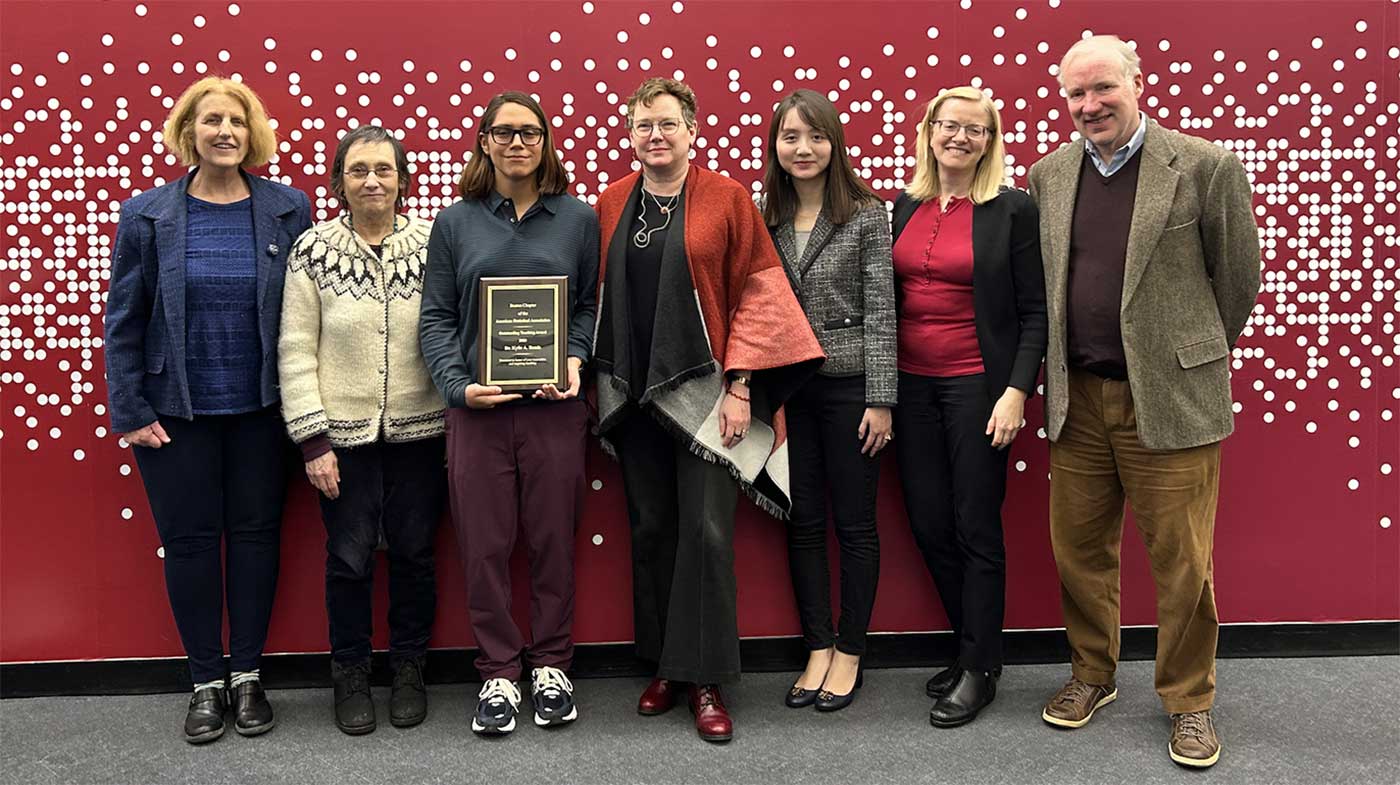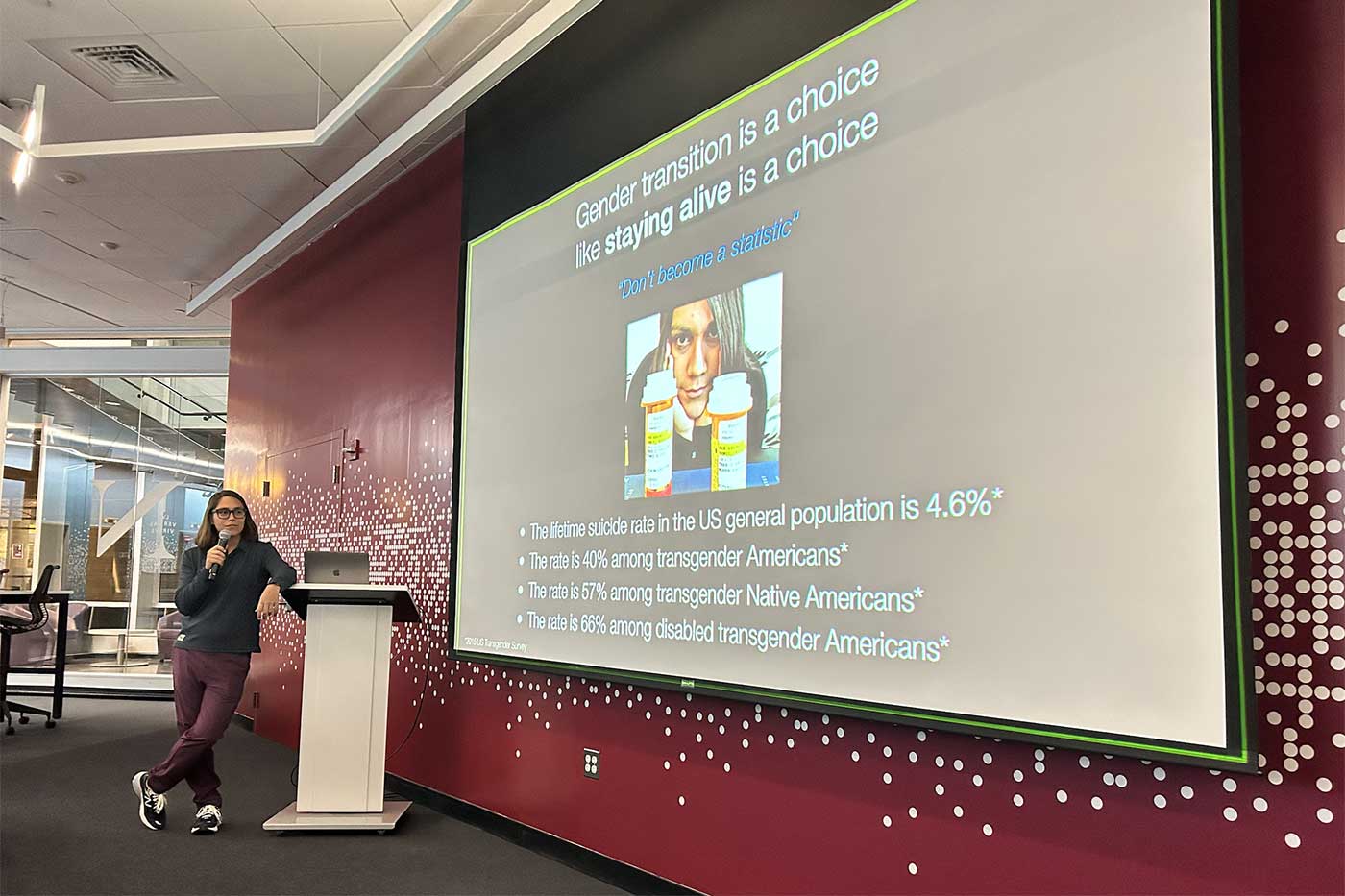For Kylie Bemis, stats teaching award is a milestone in a barrier-breaking career
Author: Jarriah Cockhren
Date: 03.25.24
 Photos by Jarriah Cockhren.
Photos by Jarriah Cockhren.
On January 31, Kylie Bemis, assistant teaching professor at Khoury College, was awarded the 2023 Outstanding Teaching Award from the Boston chapter of American Statistical Association, the “world’s largest community of statisticians.” The award ceremony, held in West Village E, began with touching remarks from the president of the ASA’s Boston chapter, Wenting Cheng, followed by Khoury College Dean Beth Mynatt.
“Kylie has taught over 1,000 students. Her mentorship, care, and concern for the student body is so deeply valued by our community, her fellow faculty members, and the students,” Mynatt said. “As a Native American, transgender woman on our faculty, she has taught me about intersectionality, the experience of our faculty and our campus, and the importance of acknowledging the Native American experience within Northeastern.”
Bemis dedicated her presentation, titled “Outliers, Life in the Tails, and the Statistics We Don’t Plot,” to members of her family who recently passed away — specifically her father, Kerry Bemis, a fellow statistician and the catalyst for her own career in statistics. She went on to talk about her undergraduate experience at Purdue University and her choice to major in statistics.
“I was interested in physics as well as mathematics, but I really ended up liking statistics, because I could apply it to any of the sciences or any kind of field that I wanted to,” Bemis said. “And so that was the thing that really drew me into statistics specifically in the first place.”
Notwithstanding the identity struggles she faced as a student at Purdue University, Bemis weathered the challenges and found a welcoming community. She eventually graduated from Purdue’s master’s program, landed a job at a statistical consulting service, embarked on a statistics Ph.D. program, and became involved with the school’s Native American Educational and Cultural Center (NAECC).
“I was offered a Sloan Indigenous Graduate Partnership, which is something that the Sloan Foundation has in a few different universities, including Purdue … for Indigenous graduate students,” said Bemis, “And they became my family away from home.”
The partnership seeks to include more Indigenous people in STEM by providing resources and funding to native students pursuing masters and doctoral degrees. In Bemis’ case, her journey took her from conducting research in California to mentoring Indigenous high school students in rural Alaska. And as it did, Bemis came to the conclusion that to complete her doctorate, she needed to make one of the most important decisions of her life, and be fully herself.
 Photos by Jarriah Cockhren.
Photos by Jarriah Cockhren.
“Getting a PhD is still hard,” she said. “But unfortunately, gender is even harder. So in the last year of my PhD program, I finally figured out that I really needed to transition if I wanted to finish that PhD and continue into that world.”
Bemis’s current research focuses on machine learning and statistical computing for bioinformatics, along with the development of the Cardinal R packages. In her teaching, which primarily covers data management and processing, Bemis extends the lessons she has learned in her journey of self-discovery and statistics to her students. She also incorporates the six Rs of Indigenous research: responsibility, relevance, relationship, reciprocity, representation, and responsibility. The framework was developed by Indigenous scholars to encourage researchers to maintain meaningful intracommunal and intercommunal relationships; it not only improves teacher–student relationships, but also enhances connections with the community and the world.
Bemis concluded the talk with acknowledgements to her parents, members and staff of the NAECC, and her doctoral advisor, Olga Vitek, for their support and encouragement. In light of the barriers for Bemis and those like her, the ASA award — as well as every stone on the path she paved to it — are worthy of celebration.
Subscribe to Khoury News
The Khoury Network: Be in the know
Subscribe now to our monthly newsletter for the latest stories and achievements of our students and faculty